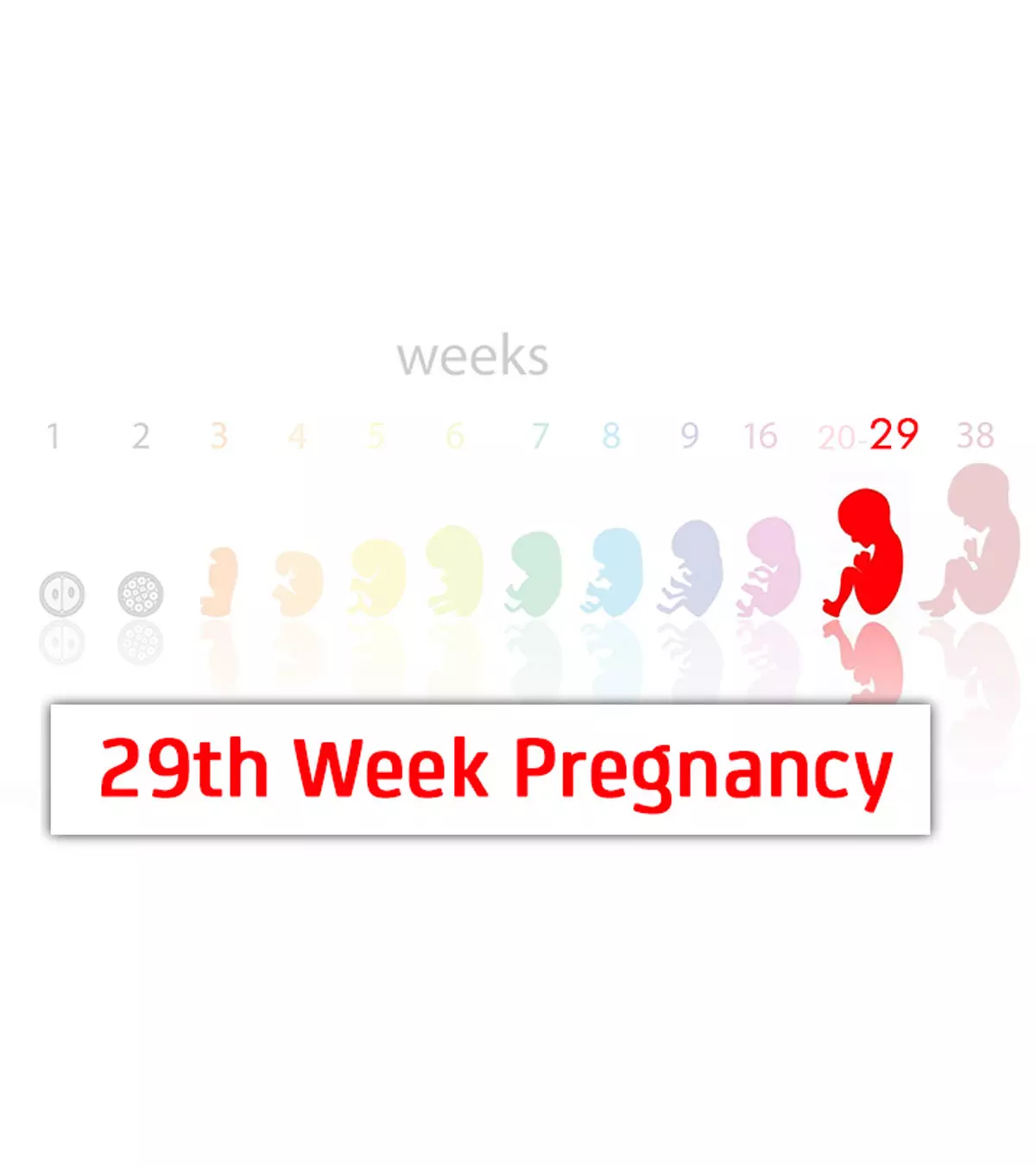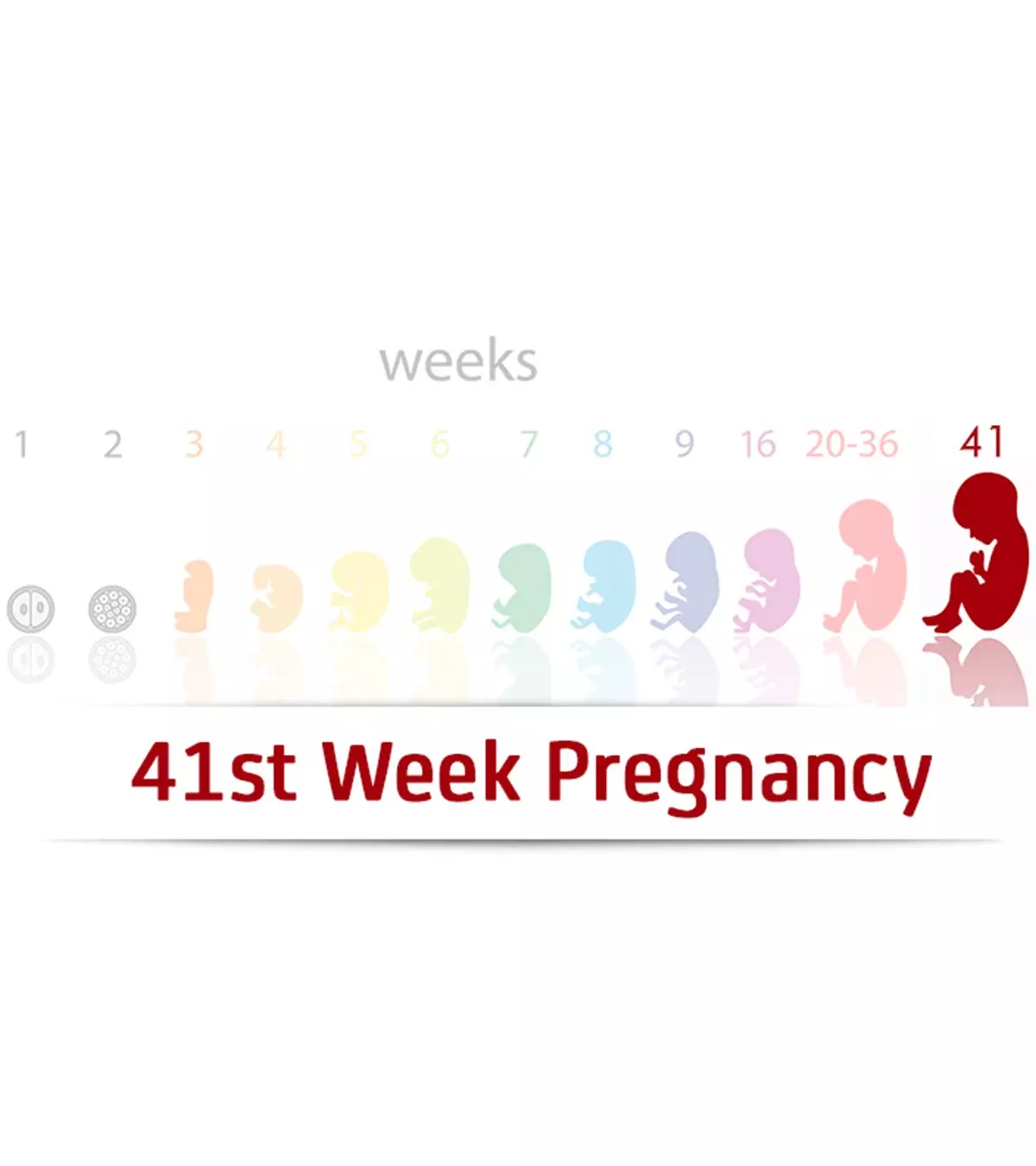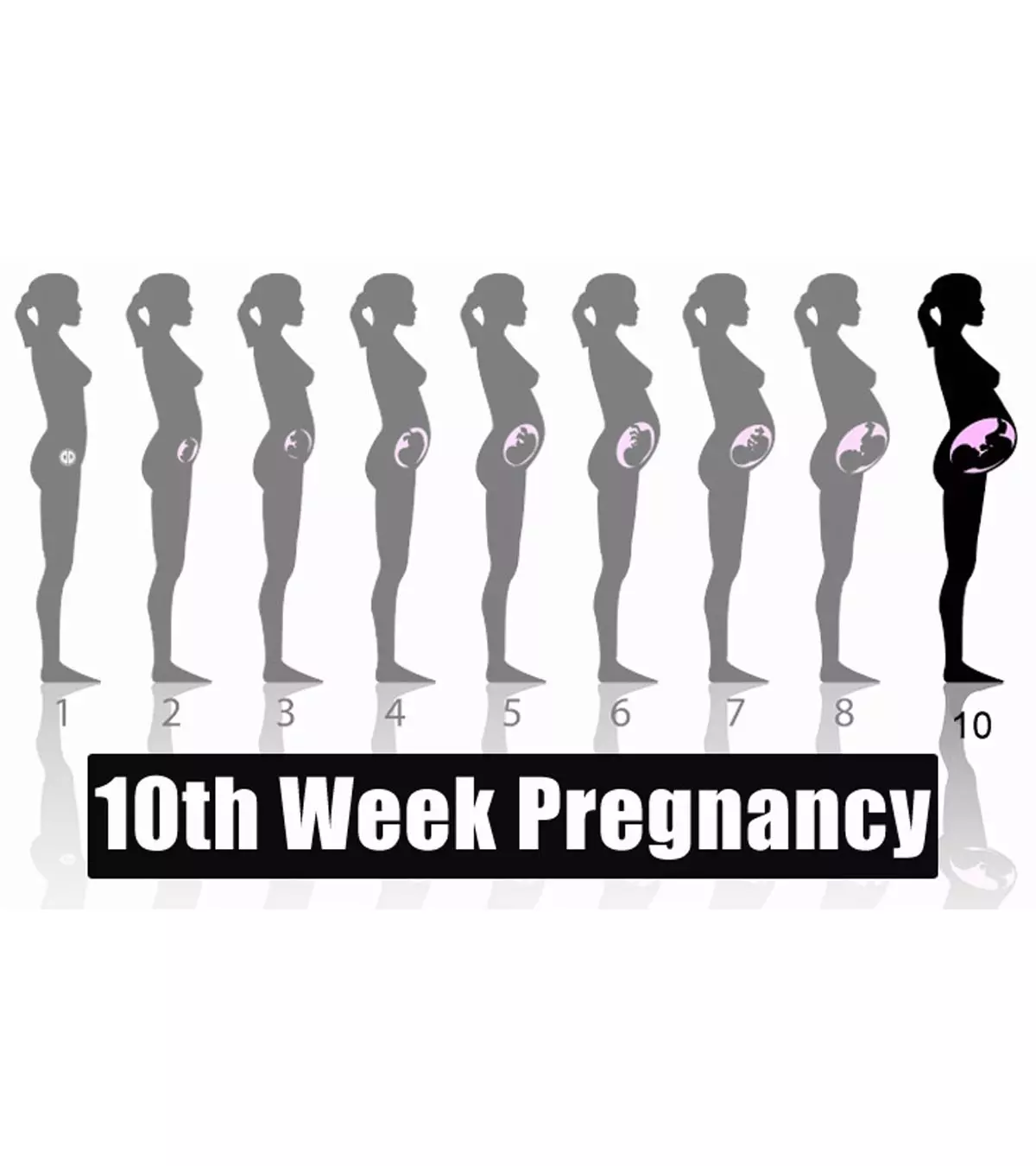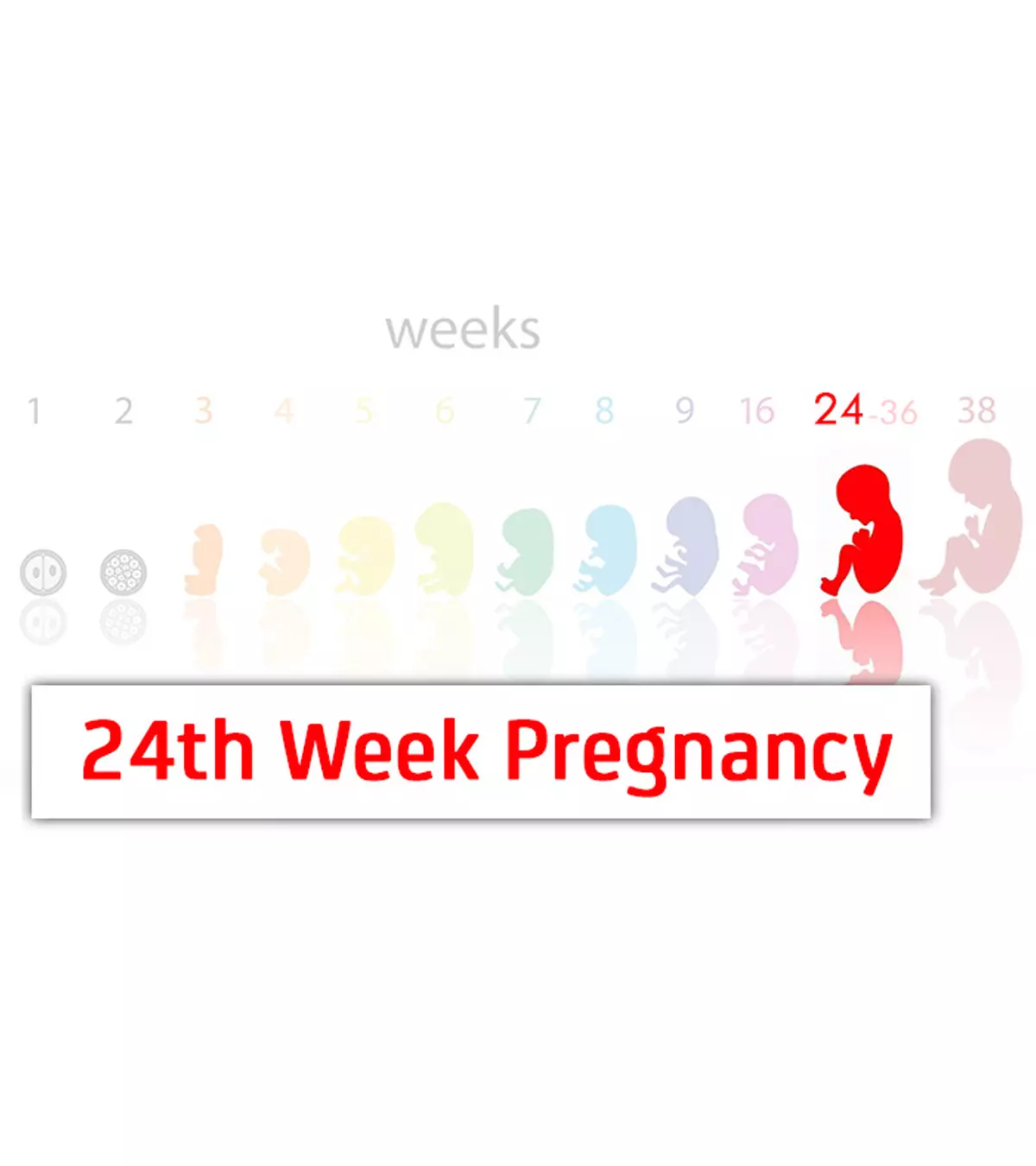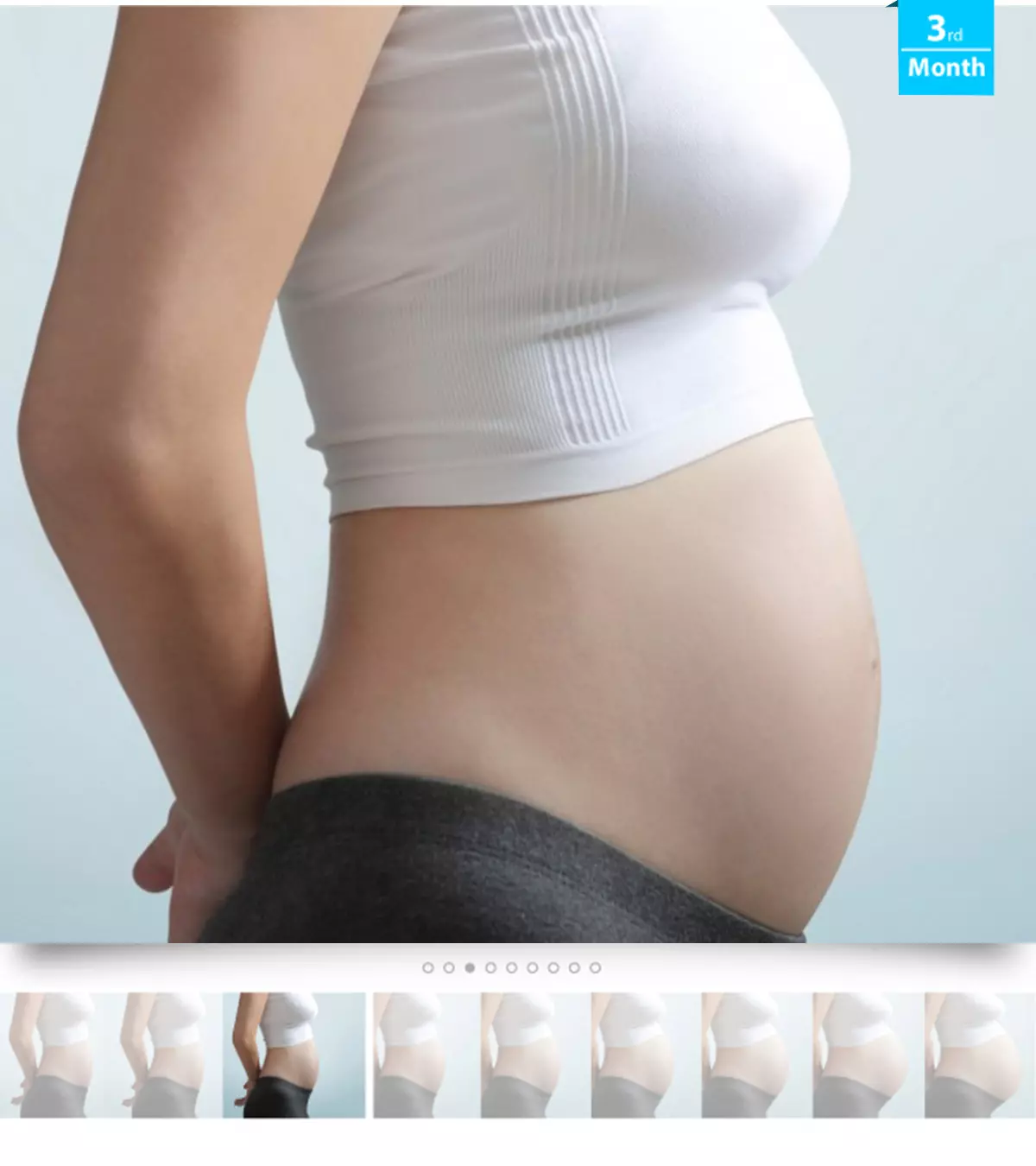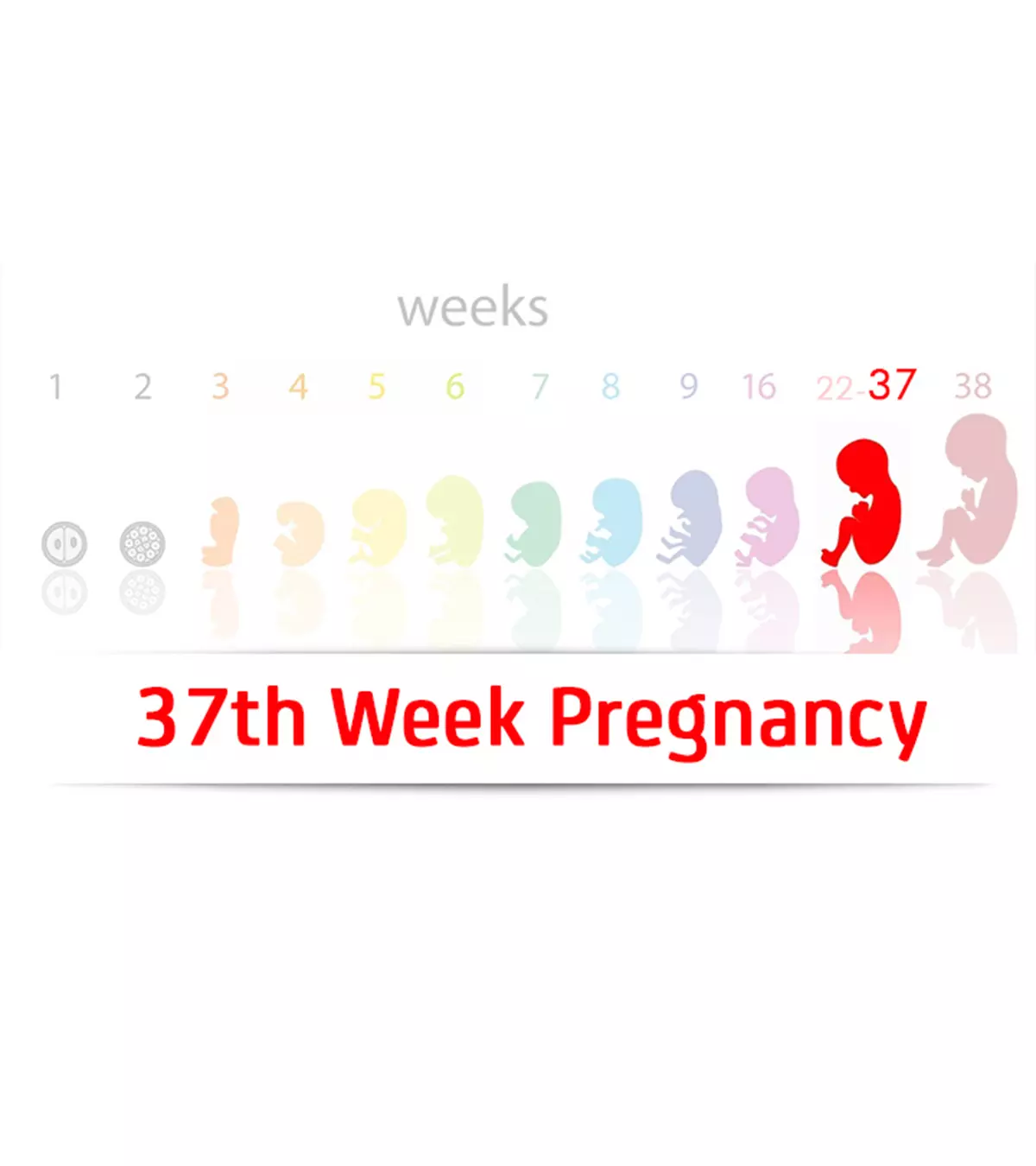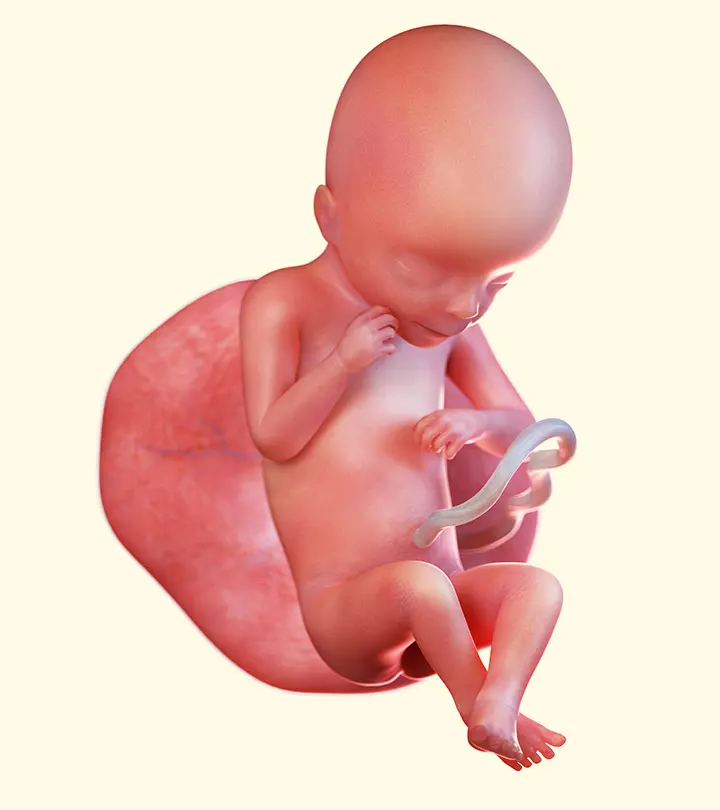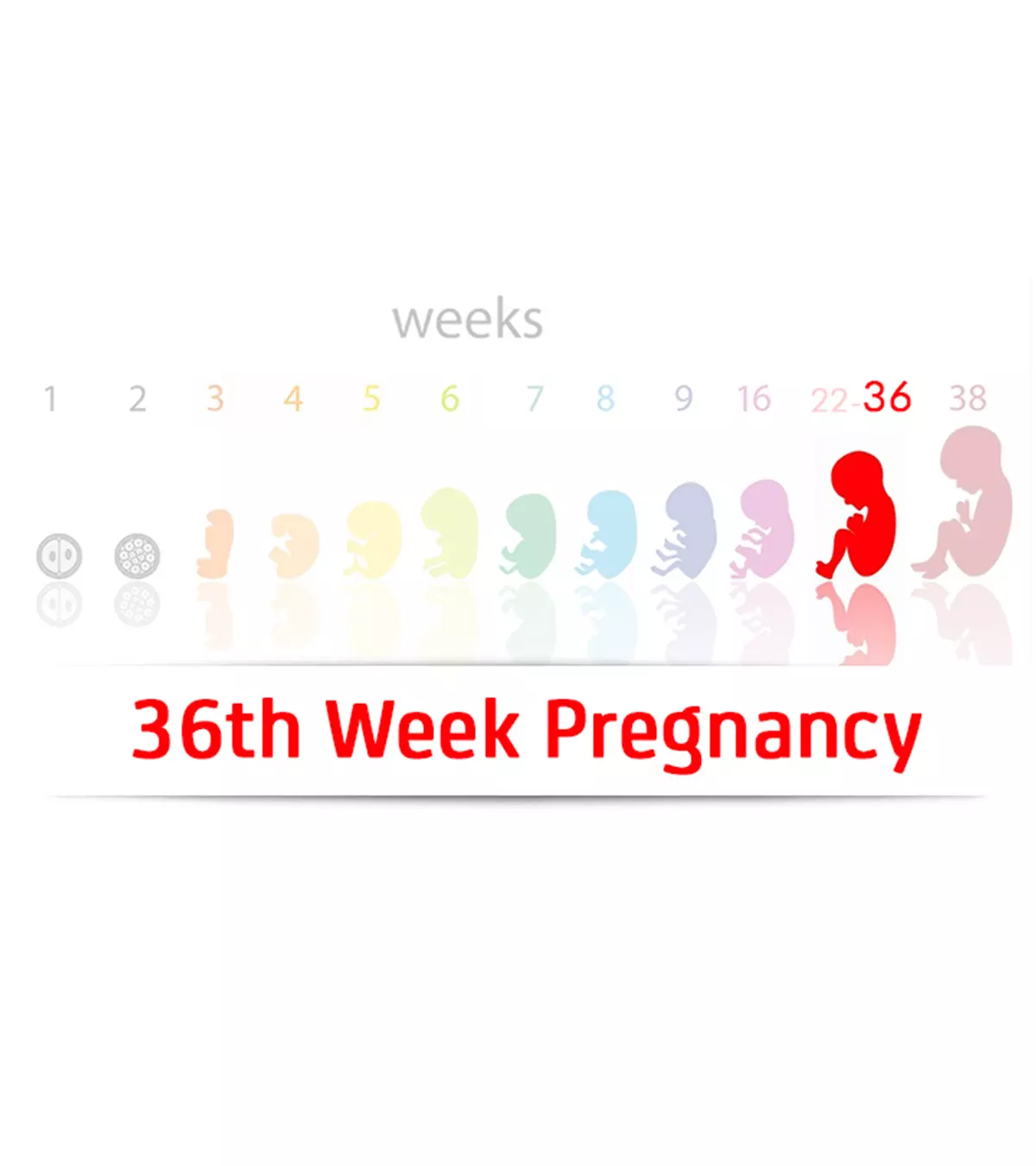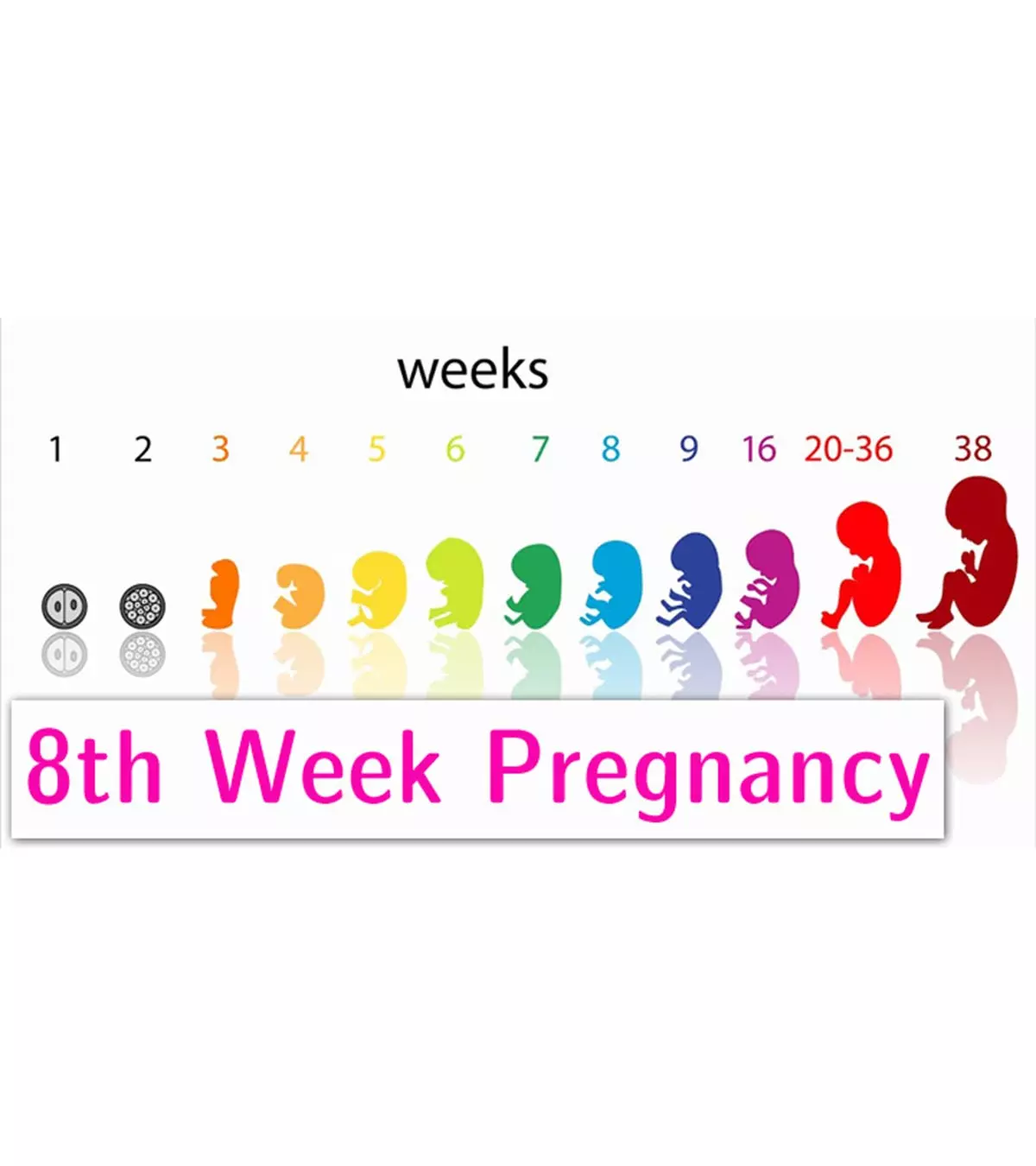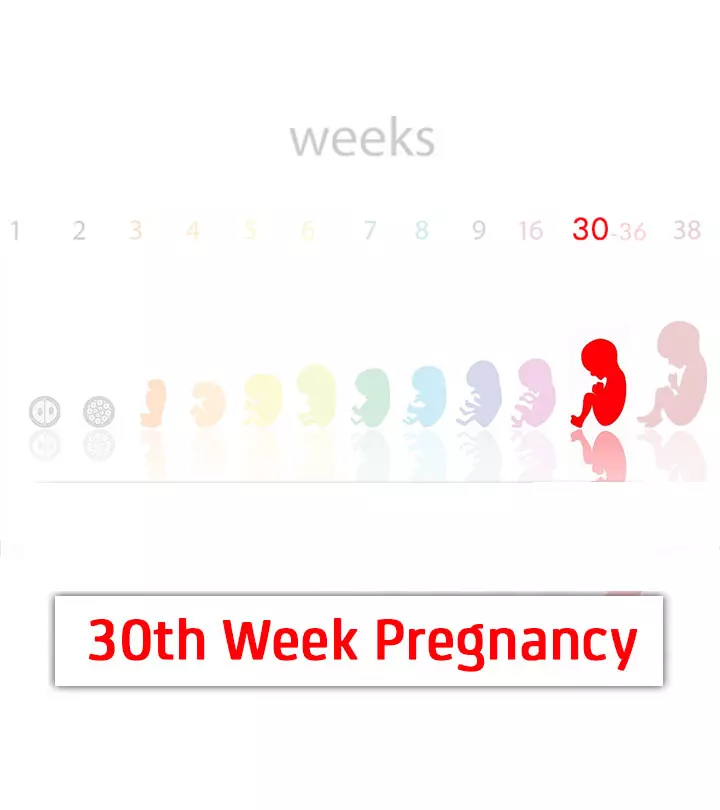
Image: ShutterStock
Key Pointers
- At 30 weeks pregnant, your baby is the size of a large cabbage and is still developing but aware of sounds.
- You may experience heartburn, increased weight gain, shortness of breath, mood swings, and Braxton hicks contraction during this time.
- Your Ob/Gyn visits may involve ultrasounds, blood pressure, and sugar check. The frequency of ultrasounds may increase in case of twin pregnancies.
- The mom and dad-to-be need to be involved and carry out the required responsibilities, such as keeping up with the prenatal tests and preparing for the baby’s arrival.
- Look for signs of concern such as fever, dizziness, continuous cramps, and bleeding, and report to the doctor.
How Many Months Pregnant Are You At 30 Weeks?
At 30 weeks pregnant, you are in the seventh month and third trimester. You are around ten weeks away from your due date.
How Big Is Your Baby At 30 Weeks?

This week, your baby is as big as a large cabbage (1). The fetal weight in this week is 15.71in (39.9cm) in length and 2.91lb (1.319kg) in weight (2). Around 1.5l of amniotic fluidiClear, yellowish liquid surrounding and protecting the developing fetus during pregnancy. surrounds the baby, eventually reducing as the baby grows and takes more space inside the uterus (3).
Baby Development At 30 Weeks
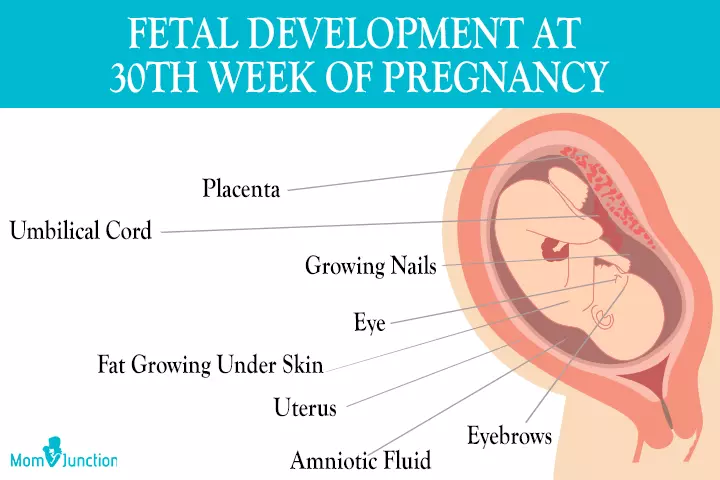
Here is how the baby is developing this week:
| Body organs | Development |
|---|---|
| Skin (4) | Looks smoother and starts accumulating fat under the skin. It is the baby’s white fat |
| Lanugo | The fine hair covering the body starts shedding. Some babies are born with some hair on their shoulder, ear, and back |
| Brain (5) | The brain tissues are developing and forming wrinkles to accommodate more brain cells. |
| Bone marrow | Is producing more red blood cells. |
| Nervous system (6) | Developed and starts controlling some body functions. |
| Lungs (7) | Are still developing, but are capable of breathing. |
| Eyelids | Begin to open and close. |
| Head | Might be full of hair. |
| Fingers | Developed and baby can suck thumb. |
| Ears (8) | Developed and the baby can react to loud sounds. |
| Tongue (9) | Taste buds are developed. |
Fetal position and movements:
The baby may be in a head-up or head-down position, as there is still some space left for the baby to move. As the due date approaches, the baby will attain the optimum position. After 36 weeks, the fetal presentation remains the same. The space inside the womb can be comparatively crunched in a twin pregnancy. The kicks get stronger by this week and can be felt frequently.
Symptoms You May Experience In The 30th Week Of Pregnancy
As the pregnancy proceeds, new symptoms may develop, even as the earlier ones remain. Symptoms that you may experience this week include:
- Weight gain: An average maternal weight gain of one to two pounds per week during the third trimester of pregnancy is considered safe, as recommended by the American Pregnancy Association (APA) (10). However, the recommended weight gain rates for women with BMI less than 18.5 and greater than 24.9 usually range between 0.5 and one pounds. Gaining weight within the healthy range during pregnancy can help prevent complications like gestational diabetes and preeclampsia.
| BMI | 18.5 – 24.9 | 25 – 29.9 | 30 and Above | ||
|---|---|---|---|---|---|
| Recommended weight gain (lb) | 18- 27 | 16- 24 | 10-18 | 7-14 | |
- Heartburn: The gastric juices forced upward into the esophagus by the growing uterus may cause you to experience heartburn.
- Trouble sleeping: Owing to body aches, frequent urination, leg cramps, and anxiety, you can sometimes have difficulty sleeping well.
- Swelling: Swollen feet and ankles during this time may occur from water retention in the body.
- Fatigue: It is common as the body works extra and needs additional nourishment.
- Difficulty in breathing: The pressure exerted by the growing uterus on the diaphragm can make it hard to breathe at times.
- Backache: The extra weight of the baby puts pressure on the lower back, causing pain in that region.
- Frequent urination: The bladder is compressed by the growing uterus, which increases the urgency to urinate more often.
- General discomfort: You may be more uncomfortable due to the increased weight from the growing belly, which may restrict your movements and cause symptoms such as back pain, frequent urination, and shortness of breath.
Julia Goolia, a mom of three, reflects on the general discomforts she experienced during the 30th week of her third pregnancy. She notes, “Exhausted some days, high on life for others. Harder to get up from lying down, difficult to carry my children around, and still with the pressure ‘down there’ that makes me feel like the baby is sitting directly on my private parts… I think I’m more tired this time around, but still feeling really good for being in the final stretch of pregnancy (i).”
- Feet changes: Fluid retention and reduced blood circulation can cause swelling in the feet. In addition, increased levels of maternal hormones might cause loosening of the joints, which in turn may cause the feet to grow bigger (11) (12).
- Varicose veins: Swelling of the veins in the legs due to increased blood flow to the lower part of the body leads to varicose veins.
- Mood swings: Mood swings during pregnancy are common, and the changes in the hormonal levels may cause you to experience them in the third trimester (13).
- Bloating and gas: As the digestion process slows down, the food remains longer in the digestive tract, creating gas and making you feel bloated.
- Constipation: The digestive tract relaxes due to the progesteroneiA female reproductive hormone that plays a vital role in menstruation, pregnancy, and breastfeeding. hormone, which slows digestion and causes constipation.
- Braxton Hicks contractions: These irregular and spontaneous contractions help your body prepare for labor and delivery.
- Stretch marks: They become prominent in the later part of the pregnancy, such as the sixth or seventh month, due to the stretching of the belly from the growing uterus (14).
These symptoms result in specific physiological and psychological changes as well.
Changes In The Body At 30 Weeks
Bodily changes women may experience during the 30th week of pregnancy are as follows.
Physical changes

- Enlarged belly, with the navel protruding out. The belly will look bigger than usual in women carrying twins or multiples.
- Swollen breasts, as the body is preparing for milk production.
- Darker areola and nipples
- Stretch marks
- Prominent linea nigra (the dark line extended on the belly)
- Change in shape of feet due to the loosening of joints caused by pregnancy hormones.
Emotional changes
- Mood swings
- Anxiety
- Stress
Considering that you are closer to the due date, there are a few risks you should be wary of this week.
 Do remember
Do remember30 Weeks Pregnant With Twins
If you are 30 weeks pregnant with twins, you may expect the following besides the other common symptoms (15) (16):
- Weight gain of 1.5lb per week, which may differ from person to person
- Frequent tiredness from otherwise easy activities
- More Ob/Gyn visits for fetal monitoring to ensure the health of both fetuses, by regularly checking fetal heart rate and overall well-being.
- Preterm labor since a twin pregnancy may increase the chances of premature birth. According to studies conducted by researchers from Sidney Kimmel Medical College and Icahn School of Medicine at Mount Sinai, twins account for 20.0% of all preterm deliveries. Among these twin pregnancies, 60.0% of cases result in delivery before 37 weeks of gestation, while 10.7% of twins are born before 32 weeks of gestation.
30 Weeks Ultrasound
At the 30th week ultrasound, you may see the following visuals and fetal development milestones (17) (18):
- Spine and ribs of the baby
- Umbilical cord with its blood vessels
- Baby’s skin appears smooth and less wrinkly
When To Call The Doctor
If you notice any of the following symptoms, ensure to call the doctor right away (19):
- Pelvic pain with or without cramping
- Fever (100.4 degrees or higher)
- A headache that doesn’t subside even after taking Tylenol (acetaminophen)
- Persistent nosebleeds
- Pain or a burning sensation while urinating
- Persistent cramps
- Dizziness
- Sudden weight gain (two pounds in one week).
- Sudden bleeding or spotting
- Sudden stoppage of fetal movement
If the symptoms are normal, go for a regular OB/GYN check-up.
Your Ob/Gyn Visit
During the visit, the obstetrician may:
- Measure the symphysis fundal height
- Check blood pressure and weight
- Advise a urine test to check for sugar or protein level
- Suggest an ultrasound to track the fetal development, especially in the case of multiple pregnancies or high-risk pregnancy.
Other tests that are done during this week:
- For pregnant women from areas where Syphilis (Sexually Transmitted Infection) is prevalent, the doctor may advise a syphilisiA sexually transmitted bacterial disease, typically causing sores in the genital and oral regions, linked to fetal complications. diagnostic test between 28 and 32 weeks of pregnancy and during delivery.
- A biophysical profile is done in the case of twin or multiple pregnancies. It is a combination of an ultrasound and a non-stress test to gauge fetal growth.
- 75gm oral glucose tolerance test if not done when 28 weeks pregnant.
- Along with the medications or supplements suggested by the doctor, you should also follow a healthy lifestyle for a healthy pregnancy.
Tips For Mom-to-be

- Avoid standing for long hours.
- Keep track of the baby’s kicks. You’ll feel the kicks better when lying down in the left lateral position.
- Avoid lying on your back.
- Stay hydrated.
- Take enough rest.
- Stay relaxed and keep all the fears and stress at bay.
- As per the NHS guidelines, a pregnant woman should get an extra 200 calories per day starting from the third trimester. Take folic acid, vitamin C, iron, and calcium supplements. Include carrots, nuts (almonds, cashews, pistachios), and frozen yogurt in your diet.
- Consuming home-cooked food plays a major role in maternal health maintenance.
- Eat smaller meals at regular intervals.
- Ensure you get all the necessary maternal nutrition by including fruits and vegetables, breakfast cereals, whole grain bread, and bran in your diet.
- Avoid lifting heavy objects.
- Avoid OTC medications unless prescribed by your doctor.
- In case of heartburn, avoid eating deep-fried, spicy foods.
- Enroll in childbirth classes to learn about labor pain-relief techniques and ideal labor positions.
- Practice Kegel exercisesiExercises that help strengthen pelvic floor muscles, improve bladder control, and support labor and delivery during pregnancy. to strengthen the pelvic floor muscles and engage in mild activities like walking. Pregnancy yoga, low-impact pilates, and gentle stretches are helpful for the pelvic muscles.
- Wear loose and comfortable clothes.
- Switch to comfortable footwear.
- Go to the hospital to familiarize yourself with the distance and time you will need to reach and prepare accordingly.
- Consult your doctor or midwife about the delivery process, requirements and preparations.
- If you like to plan ahead, consider starting to gather items for your hospital bag, discussing your birth plan with your doctor, and finishing up the nursery setup. Getting organized now can help you feel more prepared as the due date approaches. Most importantly, seek your partner’s support when needed.
Most importantly, seek your partner’s support when needed.
 Quick tip
Quick tipTips For Dad-to-be
- Here is how the dad-to-be can help.
- Create a lively ambiance at home.
- Help you with the household chores.
- Accompany you to the doctor and track the appointments.
- Partner with you during the workout sessions.
- Plan an outing for a refreshing change.
- Start shopping for the essentials you need to have during and after delivery.
- Search for baby names.
Frequently Asked Questions
1. What does a super active baby in the womb mean?
Generally, it is believed that an active baby is a healthy baby. These movements promote healthy bone and joint development. In such a case, you need not worry and stay relaxed and healthy.
2. Can I deliver in 30 weeks?
The survival rate of fetuses born between 28 and 32 weeks is around 80 to 90% (20). Some babies may be transferred to NICU for the necessary neonatal care for a day or two.
3. What does a 30-week baby do in the womb?
At 30 weeks, your baby has developed its reflexes and can be seen sucking its thumbs (18). During this time, they mostly keep their eyes closed and turn less. However, at 30 weeks, your baby will kick and poke more (21).
4. What are the signs of preterm labor at 30 weeks?
A few signs of preterm labor to look out for at 30 weeks of pregnancy are (22):
- Period-like cramps
- Pelvic pressure
- Vaginal discharge with or without blood
- Painless or painful contractions
- Low back pain
5. How many hours does a baby sleep in the womb at 30 weeks?
It has been shown that usually unborn babies in the womb sleep for about 90 to 95% of the day (23); however, after 18 weeks of pregnancy, unborn babies may prefer to nap in the womb while their mother is awake since movement can help lull them to sleep (24).
6. How do I know if my baby is head-down at 30 weeks?
To determine your baby’s position in utero, you can ask your healthcare provider to perform an ultrasound or to feel your abdomen manually. However, it is important to note that the baby’s position can frequently change in the last weeks of pregnancy, so the position at 30 weeks does not necessarily indicate the probable fetal position at birth.
The little kicks get stronger as you approach the 30th-week pregnancy. The baby weighs about 2.8lb, can suck thumb, and may react to loud sounds. Much of the space inside your belly is occupied, which may cause digestion problems, frequent urination, body pains, and difficulty breathing. An enlarged belly, swollen breasts, and stretch marks are some changes you experience at 30 weeks pregnant. Stay relaxed, avoid sleeping on your back, and follow prenatal check-ups and medication instructions. Seek medical help if you experience abnormal pain, vaginal bleeding, or contractions.
Infographic: Fetal Development During 30th Week Of Pregnancy
At the 30th week of gestation, you’re already in the seventh month of pregnancy and the third trimester. So, your baby would develop rapidly at this stage and be as big as a big cabbage. Read through the infographic below to learn about other development your fetus has been undergoing during this week of pregnancy. Illustration: Momjunction Design Team
Illustration: 30 Weeks Pregnant: Baby Development Symptoms And Tips
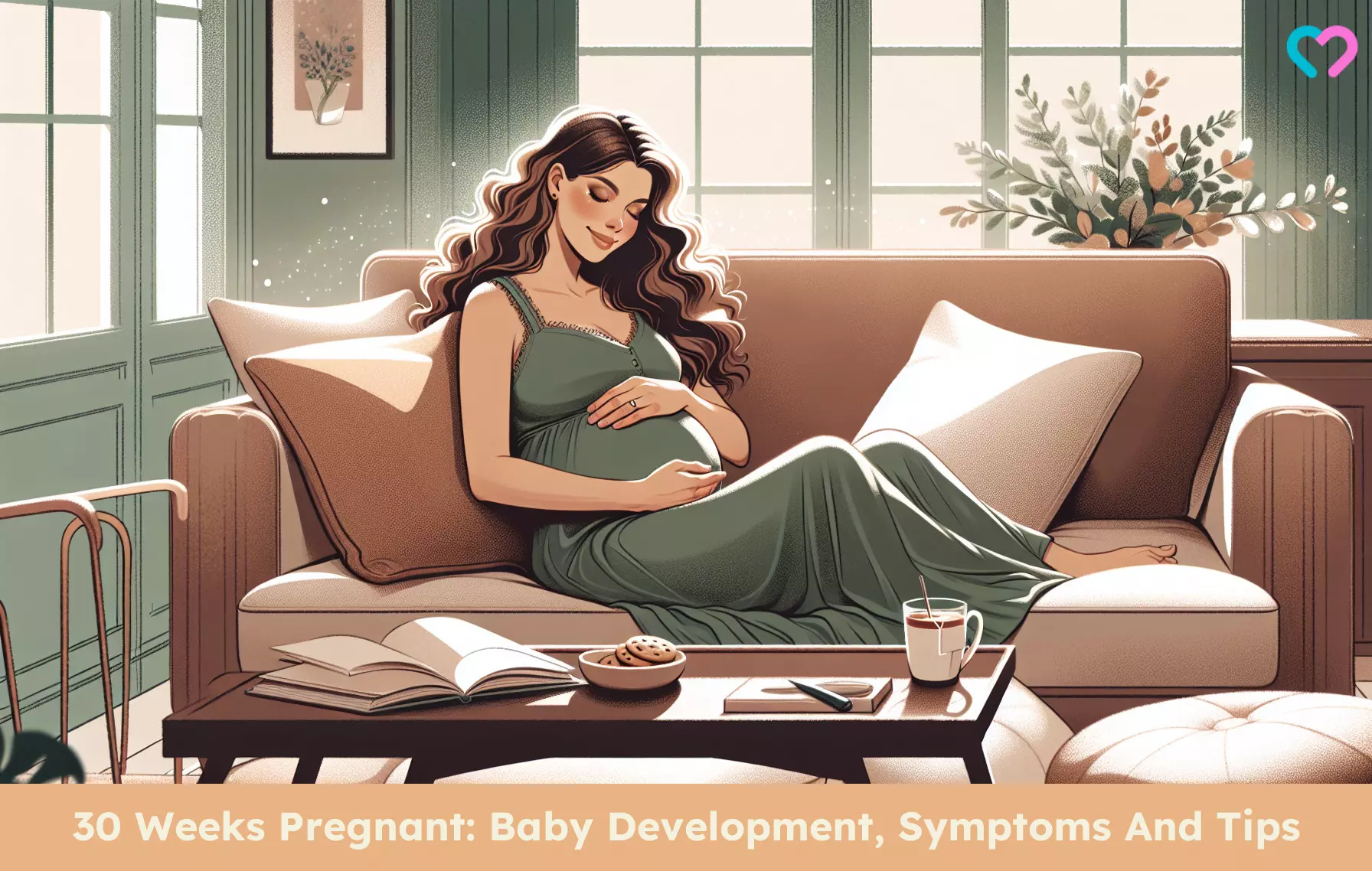
Image: Dall·E/MomJunction Design Team
Your pregnancy has reached week 30. Prepare for the cheerful changes that will come as you await the arrival of your little one. Watch this video to learn more!
Personal Experience: Source
MomJunction articles include first-hand experiences to provide you with better insights through real-life narratives. Here are the sources of personal accounts referenced in this article.
i. Baby #3: 30 weeks.https://julia-transition.blogspot.com/2014/04/baby-3-30-weeks.html
References
- 30 weeks pregnant – All you need to know.
https://www.tommys.org/pregnancy-information/im-pregnant/pregnancy-week-by-week/30-weeks-pregnant - Fetal Development.
https://embryology.med.unsw.edu.au/embryology/index.php/Fetal_Development - 30 weeks pregnant: Mama needs a new pair of shoes.
https://www.healthywomen.org/content/article/30-weeks-pregnant-symptoms-and-signs - 30 weeks pregnant.
https://raisingchildren.net.au/pregnancy/week-by-week/third-trimester/30-weeks - The third trimester.
https://www.hopkinsmedicine.org/health/wellness-and-prevention/the-third-trimester - Fetal development.
https://medlineplus.gov/ency/article/002398.htm - Stages of fetal development – third trimester.
https://ldh.la.gov/page/stages-of-fetal-development-third-trimester - When can my unborn baby hear me? I’d love to be able to read and sing to them.
https://www.healthychildren.org/English/tips-tools/ask-the-pediatrician/Pages/I%E2%80%99m-pregnant-and-would-like-to-sing-to-my-unborn-baby.aspx - Your growing baby.
https://www.allinahealth.org/health-conditions-and-treatments/health-library/patient-education/beginnings/third-trimester/whats-happening/your-growing-baby - Pregnancy weight gain.
https://americanpregnancy.org/healthy-pregnancy/pregnancy-health-wellness/pregnancy-weight-gain/ - Changes in your body during pregnancy: Third trimester.
https://familydoctor.org/changes-in-your-body-during-pregnancy-third-trimester/ - 30 weeks pregnant.
https://americanpregnancy.org/healthy-pregnancy/week-by-week/30-weeks-pregnant/ - Your third trimester.
https://www.lamaze.org/Giving-Birth-with-Confidence/GBWC-Post/your-third-trimester - Pregnancy stretch marks.
https://americanpregnancy.org/healthy-pregnancy/pregnancy-concerns/what-are-pregnancy-stretch-marks/ - Twin Pregnancy.
https://my.clevelandclinic.org/health/articles/23158-twin-pregnancy - Weight Gain in Twin Pregnancies.
https://www.ncbi.nlm.nih.gov/books/NBK235233/#:~:text=Total%20weight%20gain%20of%2016,and%20third%20trimesters%20of%20pregnancy - Ultrasound pregnancy.
https://www.mountsinai.org/health-library/tests/ultrasound-pregnancy - You and your baby at 30 weeks pregnant.
https://www.nhs.uk/pregnancy/week-by-week/28-to-40-plus/30-weeks/ - What are some warning signs of potential pregnancy complications?
https://www.beaumont.org/conditions/pregnancy-warning-signs - When is it safe to deliver your baby.
https://healthcare.utah.edu/womens-health/pregnancy-birth/preterm-birth/when-is-it-safe-to-deliver - Your baby’s movement during pregnancy.
https://www.peacehealth.org/medical-topics/id/aby3689 - Amphan Chalermchockcharoenkit (2002); Preterm Labor; Thai Journal of Obstetrics and Gynecology.
https://he02.tci-thaijo.org/index.php/tjog/article/download/88393/pdf_143/215933 - Janet L. Hopson; Fetal Psychology; Psychology Today.
https://www.leaderu.org/orgs/tul/psychtoday9809.html - Bonding with your baby during pregnancy; Pregnancy, Birth and Baby; Australian Government.
https://www.pregnancybirthbaby.org.au/bonding-with-your-baby-during-pregnancy
Community Experiences
Join the conversation and become a part of our nurturing community! Share your stories, experiences, and insights to connect with fellow parents.
Read full bio of Subhashis Samajder
Read full bio of Aneesha Amonz
Read full bio of Rebecca Malachi
Read full bio of Dr. Joyani Das






